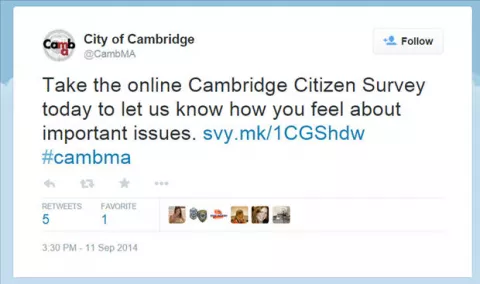
This year the city of Leavenworth, Kansas, polled its citizens twice. The first time city leaders asked for community input on seasonal public services such as the leaf pickup and snow removal programs. The second poll solicited feedback on the city’s street repair, garbage collection and recycling programs.
What’s notable here is that the city conducted both surveys using the online tool SurveyMonkey. And that it promoted the surveys using the city’s website, Facebook page and Twitter account. And that the survey results were made available at the city website as a PDF file.
Welcome to the world of capturing citizen opinion -- digitally.
Indeed, a new breed of civic feedback solutions has emerged that reaches well beyond the customary public meeting held at a set time and place. One example is iCity from Council Associate Partner Imex Systems based in Toronto. The collaboration features of iCity foster interaction between various groups and organizations within a municipality, for example allowing citizens to share input on the direction and future of their neighborhoods. The iCity portal enables collaboration between citizens, businesses and visitors, making the online presence of the city one that is driven as much by citizens as by government.
Here’s a quick look at some other online technologies that cities are embracing to more effectively capture input and ideas from local residents.
Creating informal forums with feedback portals
Many local governments are opting for pre-baked civic engagement products designed for informal polling of residents. These cloud-based solutions -- which often integrate with existing city websites -- enable users to post responses to specific topics introduced by city staff. They also typically enable citizens to post their own ideas and let others vote and comment on them -- much like today’s crowdsourcing solutions. These products often allow public polling, too. Here are a few examples of feedback portals cities have implemented.
- SpeakUpWilliamsburg is a forum that allows residents of Williamsburg, Virginia, to sound off. The site is built on the cloud-based “ideation” platform from Granicus called SpeakUp.
- WestyCOnnect lets citizens of Westminster, Colorado talk to city officials and staff. The portal is powered by MindMixer, another widely used cloud-based platform. Joe Reid, the city’s public information officer, explained that about 20% of users registered are in the age range of 25-34, showing the site is drawing involvement from a younger demographic.
- Mountain View Open City Hall is the cloud-based citizen forum recently launched by the city of Mountain View, California. Peak Democracy offers the Open City Hall solution and emphasizes that its in-house staff and software closely monitor forum comments to ensure a high level of civility.
Focusing on civic issues with online surveys
As Leavenworth, Kansas demonstrates, city leaders are finding Web survey products useful tools to gauge citizen’s priorities and inform their decision-making. In addition to SurveyMonkey, SurveyGizmo and Qualtrics are popular cloud-based services that cities might use to build surveys.
Cities commonly use these survey tools to provide guidance on specific topics. For instance, the city of Castroville, Texas, conducted a survey to take the public’s pulse on planning around city offices, a city utility yard, and regional park uses. Online surveys also get used to supplement other polling techniques. For instance, when the city of Cambridge, Massachusetts conducts its biennial citizen survey, an online survey is used in conjunction with telephone interviews and paper forms.
Prompting citizen dialogue with city blog posts
Blog posts from city leaders are also mechanisms to spur citizen comments and even back-and-forth conversation. With blogs, city leaders have an opportunity to present their perspective and then invite citizens to respond with their opinions.
The blogs from city managers Gary Huff of Piqua, Ohio, and Scott Neal of Edina, Minnesota, are good examples of blogging that spotlights important community issues, rather than simply reciting everyday city events and activities.
Driving feedback with social media
In a 2013 survey the International City/County Management Association (ICMA) found that 84% of local governments have a social media presence. And cities with Facebook pages and Twitter accounts are starting to use them as citizen feedback channels.
Online town hall meetings in particular are gaining attention. At these events cities engage citizens via social media outlets for a scheduled time period. For instance, a city official might present information on budgets or other matters and invite citizens to ask questions in real time or post comments. Cities as varied as Wichita and Vancouver, BC are experimenting with using social media events as feedback opportunities.
Cities can also use their social media sites to drive visitors to other city tools that gather citizen input, such as surveys, blogs and feedback portals.
Civic engagement resources
The International City/County Management Association (ICMA) has compiled a comprehensive list of technology vendors offering civic engagement tools. It’s available here.



